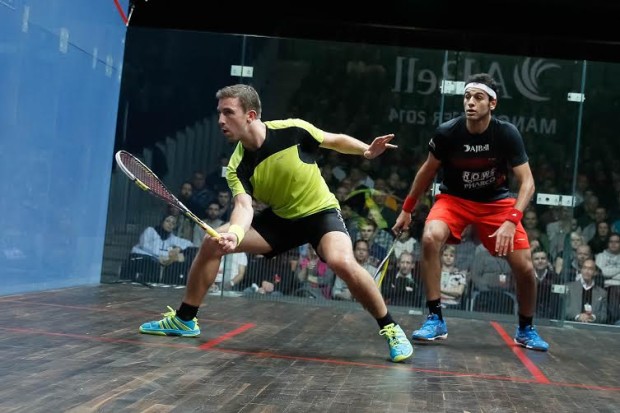
Squash Mad asks recently-retired Mathieu Castagnet his influences and his current views on the sport
Playing for the French national team was a very important part of your career wasn’t it?
M.C.: I’ve always loved team events and to be honest I think I played better in those! Representing my country and sharing some emotions with my teammates was special. Among my best memories, there is of course our first title at the European Team Championship in 2015 after so many lost finals against England. I would have liked to play in a World Team Championship final, and its cancellation in 2015* was a massive blow for us. Grégory Gaultier had just been crowned world champion and got back to world number 1, and as for me I was in the shape of my life. In a three-player format, having two top 10 players is a big asset and I am convinced we had a great opportunity to be world champions that year.
*After Kuwait was banned by the IOC, the 2015 World Team Championship had been relocated in Egypt and then definitely cancelled following the terrorist attacks in Cairo.
What people had the biggest influence and impact throughout your career?
M.C.: My wife Laura is right up there without a doubt. Thanks to her I paid much more attention to details, for example regarding recovery, while before I was not very good at these things. Then there are all my coaches, from my father in my early days to Renan Lavigne at the end of my career. As far as players are concerned, I was a big Peter Nicol’s fan when I was young, and then there were Amr Shabana and Ramy Ashour. They had different styles but they were both magicians, you were wondering how it was possible to play like them. Shabana was so smart on court, he had the ability to constantly put the ball in the worse spot for his opponent. Ramy was a unique player, probably unbeatable when at 100 per cent. He played at an incredible speed, thanks to his wingspan and his ability to generate power with a very short swing. He was fearless and would not hesitate to go for winners at key moments of a match. It was an honor for me to share a court with these guys.
Best matches of your career?
M.C.: The first one that comes to mind is the 2016 Canary Wharf Classic final against Omar Mosaad, above, I think I made zero unforced error in that match! In some days you feel like nothing can happen to you without really being able to explain why, sorry Omar but I think this one was meant to be (he laughs). Then there is my win in 2020 in Chicago against Saurav Ghosal. The quality was amazing, it’s probably the best match I ever played on a traditional court (author’s note: Mathieu had won 12-10 on the fifth game after 100 minutes of play).
What’s your current view on men’s squash, in France and beyond?
M.C.: A few years ago there was quite a gap between the four French best players (Grégory Gaultier, myself, Grégoire Marche and Lucas Serme) and the rest. Today, there is a greater strength in depth and that’s obviously a very good thing. As far as the PSA World Tour goes, the world top 30 is also very strong and there are no more easy matches. However, and this is only my opinion, I feel like the top 10 is less impressive than a few years ago. I’d like to point out that I am not including myself when I say that, I am rather referring to the early 2010s*. Today, all the players are very fit but I think there is less creativity and not as many legends of the game playing at the same time as there used to be.
*At the beginning of the 2011/12 season, the top 10 included world number 1 Nick Matthew, six players who had previously held that spot – Ramy Ashour, Karim Darwish, Amr Shabana, Grégory Gaultier, David Palmer and Thierry Lincou and two others who would later – James Willstrop and Mohamed ElShorbagy.
What about the state of squash as a sport in general?
M.C.: In the clubs, we are witnessing the decline of squash and the rise of other sports such as padel nowadays. I think that over the years, squash suffered from a combination of several factors: it was overshadowed by tennis, and the wrong idea that it’s dangerous for the heart was very detrimental. Not to mention the fact that we didn’t make the Olympics, especially the ones in Sydney in 2000 when Australian squash was very strong, it could have been a boost.
One thing’s for sure, even if France won the World Team Championship tomorrow it wouldn’t make any difference to the popularity of squash. Clubs do what they can, but if we want to grow it’s crucial that we reach people who have have never heard of squash. To do so, you have to bring it to schools – like badminton does – and universities. Besides, I think the rules are hard to understand for an average viewer compared to other sports. I am aware it’s not easy, but if they were simpler we might be able to get more people interested.















 Phone: (800) 737. 6040
Phone: (800) 737. 6040 Fax: (800) 825 5558
Fax: (800) 825 5558 Website:
Website:  Email:
Email: 






